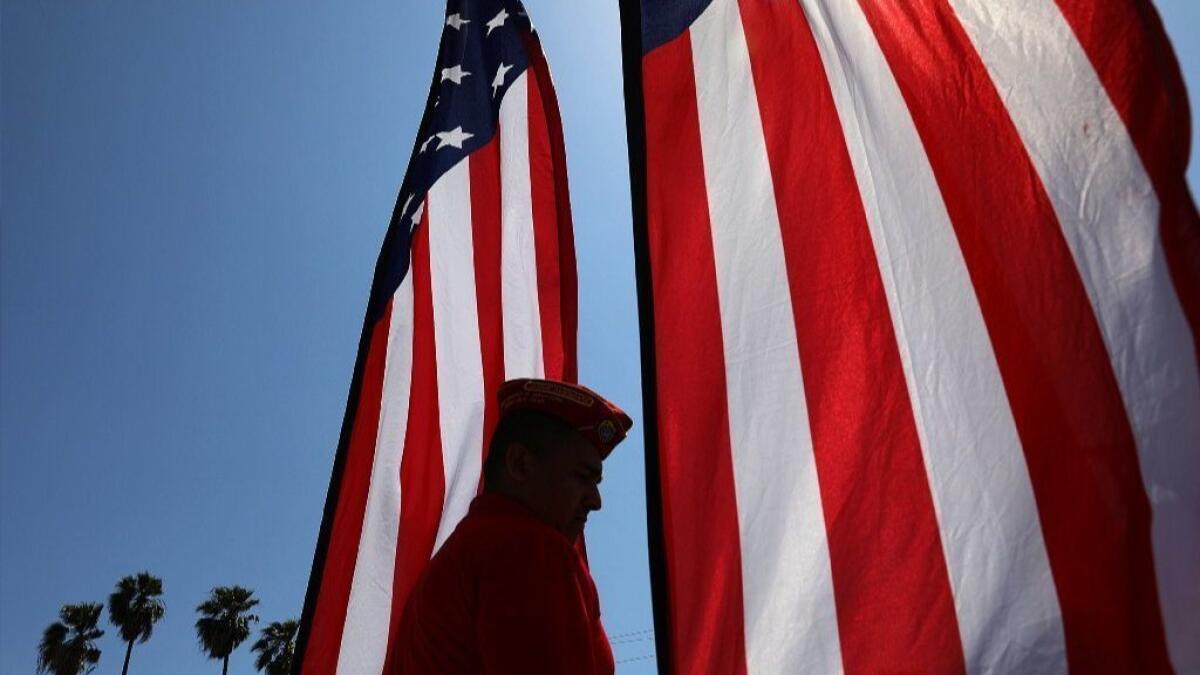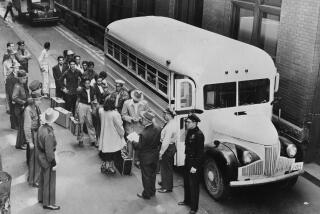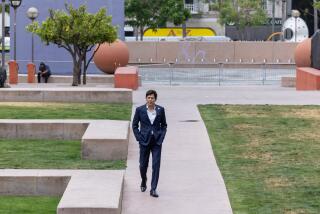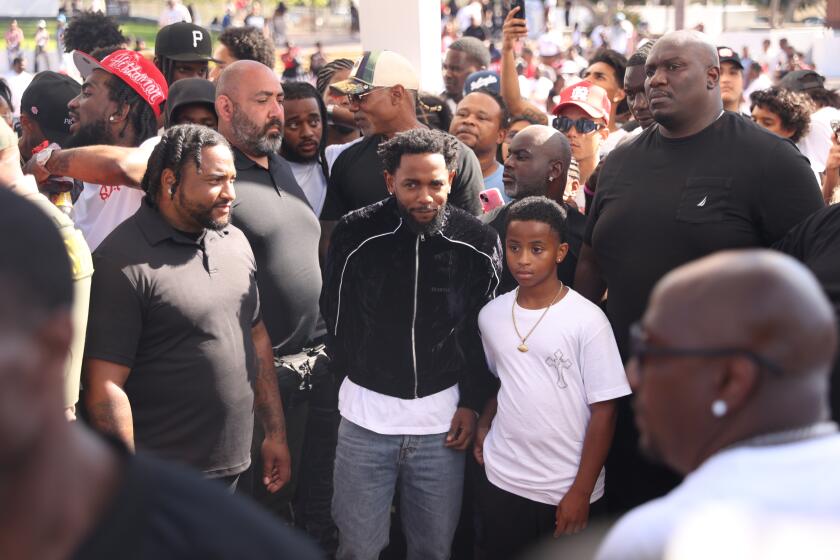Veterans, volunteers hold 24-hour vigil at World War II memorial in Boyle Heights

As a girl, Christina Venegas remembers visiting the stone pillar erected in 1947 at a five-point intersection near her Boyle Heights home to honor Mexican American veterans, such as her father, who fought in World War II.
Venegas and her family moved to El Sereno in the 1960s, but she continued to visit the Boyle Heights memorial with her father, who died at age 97 in 2014.
She went once again to pay her respects on the eve of Memorial Day.
“So many are not here anymore, but we have to remember what they did,” Venegas said as she gazed at the memorial. “They gave their lives, and that is a very humbling thing.”
As she reflected on the significance of the monolith, three teenage girls — cadets for the Los Angeles Police Department — stood guard before it, their hands crossed purposefully behind their backs. Every year on the eve of Memorial Day, volunteers take turns standing watch over the memorial from 10 a.m. Sunday to 10 a.m. Monday.
Volunteers included members of the LAPD cadets, Marine Corps League, Disabled American Veterans, U.S. Navy and others who take part in three-hour shifts.
Closing the patriotic vigil, as it’s called, is a traditional Memorial Day tribute to the fallen. This year’s speakers include Los Angeles County Supervisor Hilda Solis, Rep. Lucille Roybal-Allard (D-Downey) and U.S. Air Force veteran Theresa Varn.
Venegas’ father, Martin Venegas, joined the Marines in the 40s and worked as an iron factory foreman through the end of WWII. A native of Chihuahua, Mexico, he attained U.S. citizenship through the military.
For Christina Venegas, it means a lot that a memorial dedicated to people like her father stands in the Mexican American neighborhood where she grew up.
“It’s something orgulloso,” she said. “You just feel that pride.”
Jose Diaz, 46, has volunteered to help plan the vigil for the last 20 years. Like Venegas, his late father attained U.S. citizenship through the military.
At age 16, Diaz’s father entered the country illegally through Mexicali in 1952. Three years later, he joined the Army and went on to serve in the Vietnam War.
Diaz said people like his father should continue to be granted citizenship.
In a 2016 report, the American Civil Liberties Union said there were at least 239 deported veterans in 34 countries. The issue affects legal residents who served in the military and were honorably discharged, but then were convicted of crimes. Because they had not become U.S. citizens, they were deported after serving their sentences, returning to countries that many had left as children.
“There’s men and women who are still serving now and hoping to become citizens,” he said. “They should be the first ones who become citizens.”
Tony Zapata, 73, was in charge of discharging the LAPD cadets, who traded off every 15 minutes. “Forward, march,” he commanded two teen boys in light blue uniforms. They advanced to the memorial, their hands balled into fists.
Zapata served in the Navy in Vietnam and later in the Western Pacific from 1965 to 1969. Now he serves as junior vice commander for the Veterans of Foreign Wars.
Back then, serving in the military as a Latino wasn’t easy. Zapata was called a “beaner” and a “wetback.” His father, who served in WWII, told him about being passed up for promotion by whites with less experience.
But his father always told him to never let discrimination bother him.
“I’m proud of my heritage,” he said, standing before the memorial. “This right here shows it.”
Venegas found comfort talking to LAPD Officer Austin Fernald, whose own father served during WWII in Europe and passed away last month.
Fernald had regularly attended events honoring veterans with his father. Sunday marked his first alone.
“It’s just so many memories. I really miss him — as do you,” said Venegas, tearing up and sqeezing Fernald’s shoulder.
“They’re here,” he told her, “through us.”
More to Read
Sign up for Essential California
The most important California stories and recommendations in your inbox every morning.
You may occasionally receive promotional content from the Los Angeles Times.










